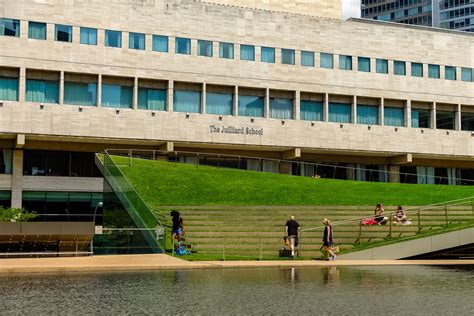Overview
Juilliard, one of the world’s most prestigious performing arts schools, is renowned for its exceptional talent and rigorous training. However, gaining admission to Juilliard is a highly competitive process, with an acceptance rate that typically hovers around 4-6%.

Acceptance Rate Statistics
According to the 2023 Common Data Set, Juilliard’s acceptance rate for the academic year 2022-2023 was:
- UnderGraduate Programs: 3.5%
- Graduate Programs: 5.8%
Factors Influencing Acceptance
The acceptance rate for Juilliard varies significantly depending on the program of study. The most competitive programs, such as the Bachelor of Music in Performance, tend to have lower acceptance rates than less competitive programs, such as the Master of Music in Music Education.
In addition to program selectivity, other factors that influence acceptance include:
- Artistic ability: Juilliard seeks exceptional musicians, dancers, and actors with proven talent and potential.
- Academic achievement: Strong academic performance, particularly in music-related subjects, is essential.
- Audition performance: The audition is a critical component of the application process, and candidates must demonstrate their technical proficiency, musicality, and stage presence.
- Personal statement: The personal statement provides an opportunity for candidates to articulate their motivations, aspirations, and Artistic vision.
- Letters of recommendation: Strong letters of recommendation from reputable sources can provide valuable support to an application.
Tips and Tricks for Success
To increase your chances of acceptance to Juilliard, consider the following tips and tricks:
- Start early: Begin preparing your application materials well in advance of the deadline.
- Research the programs: Familiarize yourself with the different programs offered at Juilliard and identify those that align with your interests and career goals.
- Practice diligently: Dedicate ample time to honing your artistic skills and preparing for the audition.
- Seek professional guidance: Consider working with a private instructor or mentor to improve your technique and audition performance.
- Network with faculty: Attend performances and meet with faculty members to demonstrate your interest and dedication.
- Write a compelling personal statement: Take time to craft a personal statement that showcases your unique qualities and aspirations.
- Gather strong letters of recommendation: Request letters of recommendation from individuals who can attest to your talent, work ethic, and character.
Common Mistakes to Avoid
Avoid the following common mistakes that can hinder your chances of acceptance:
- Underestimating the competition: Juilliard is highly selective, and underestimating the competition can lead to disappointment.
- Preparing hastily: Rushed applications and inadequate preparation for the audition can reflect poorly on your abilities.
- Neglecting academics: While Artistic ability is paramount, Juilliard also values academic excellence.
- Lacking a clear artistic vision: Demonstrate a clear understanding of your artistic goals and how Juilliard can help you achieve them.
- Not seeking feedback: Seek constructive feedback from instructors, mentors, and other musicians to improve your application materials and audition performance.
Step-by-Step Application Process
To apply to Juilliard, follow these steps:
- Create an online application: Submit an application through the Common Application or the Juilliard website.
- Submit required materials: Include transcripts, personal statement, Letters of recommendation, and other required materials.
- Schedule an audition: Contact the admissions office to schedule an audition and prepare the required repertoire.
- Attend the audition: Perform a solo or ensemble piece and engage in a brief interview with faculty members.
- Review and make a decision: Juilliard will review your application materials and audition performance before making a decision.
The Role of Creativity
In addition to the aforementioned factors, creativity plays a crucial role in Juilliard admissions. Candidates who demonstrate an unconventional approach to their art and a willingness to explore new ideas are likely to stand out from the crowd. To think “outside the box,” consider:
- Repertoire selection: Choose pieces that showcase your unique musicality and interpretive abilities.
- Artistic presentation: Experiment with different ways to present your audition, such as incorporating movement or technology.
- Exploration of new genres: Demonstrate a willingness to explore musical genres beyond your traditional repertoire.
Tables
| Program | Acceptance Rate |
|---|---|
| Bachelor of Music in Performance | 3.4% |
| Bachelor of Music in Composition | 3.9% |
| Bachelor of Music in Jazz Studies | 4.1% |
| Bachelor of Fine Arts in Dance | 4.3% |
| Master of Music in Orchestral Performance | 5.6% |
| Master of Music in Chamber Music | 5.7% |
| Master of Music in Opera Studies | 5.9% |
| Average SAT Scores (25th-75th percentile) |
|—|—|
| Critical Reading | 720-780 |
| Math | 690-750 |
| Writing | 730-790 |
| Average ACT Scores (25th-75th percentile) |
|—|—|
| Composite | 33-36 |
| English | 34-37 |
| Math | 32-35 |
| Science | 31-35 |
| Top Feeder High Schools (2022) |
|—|—|
| Fiorello H. LaGuardia High School of Music & Art and Performing Arts | 25 |
| Interlochen Center for the Arts | 17 |
| Manhattan School of Music Precollege | 16 |
| Juilliard School, The Pre-College Division | 15 |
| San Francisco Conservatory of Music Pre-College | 14 |
